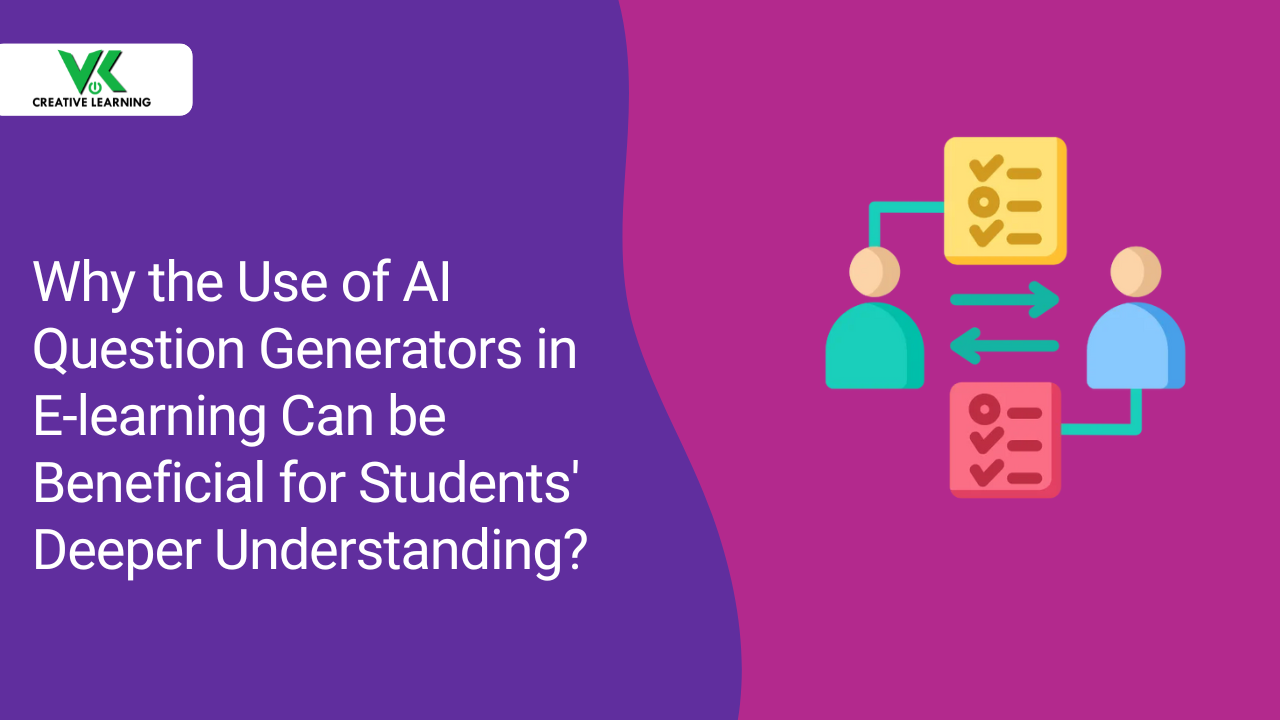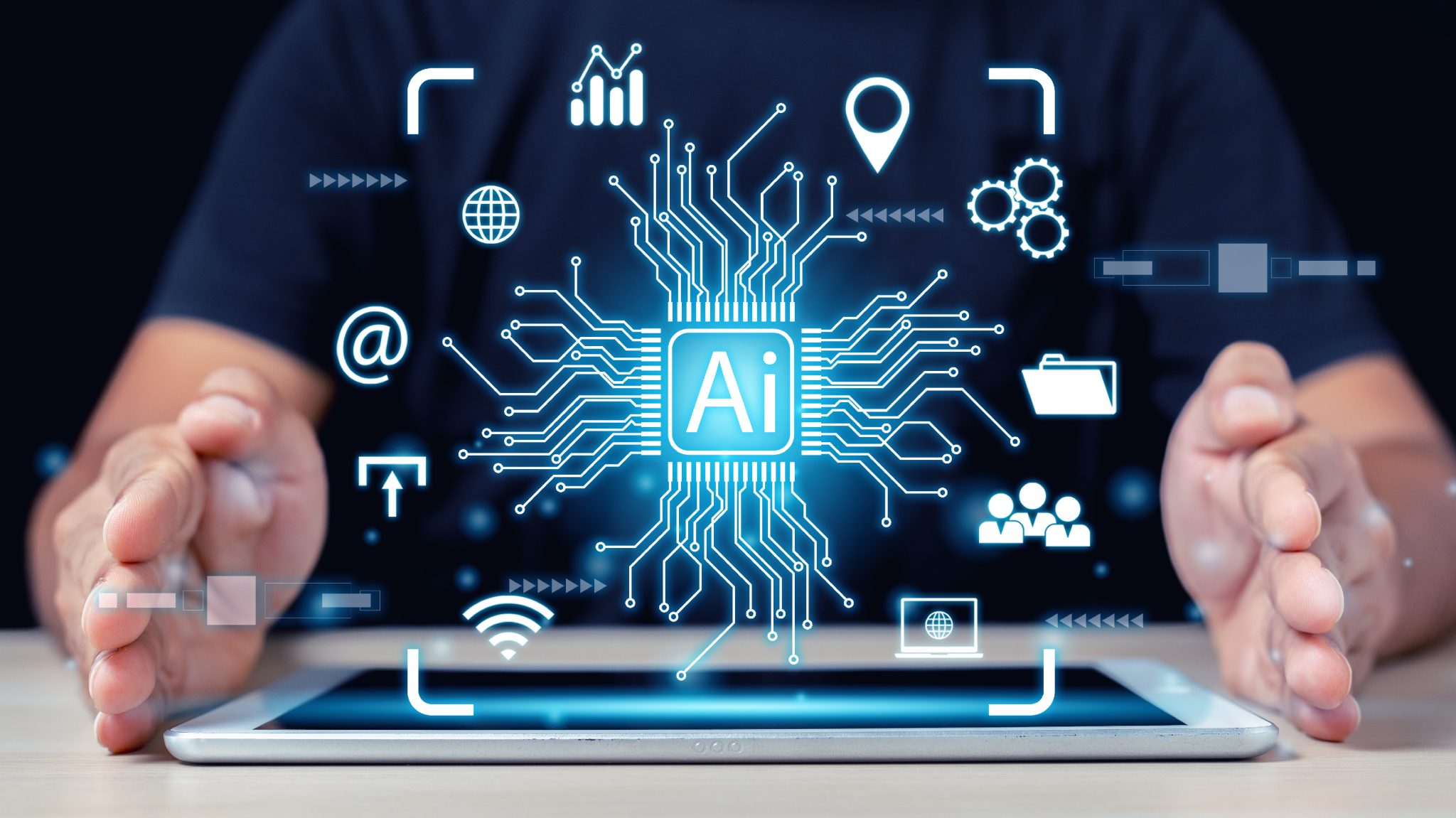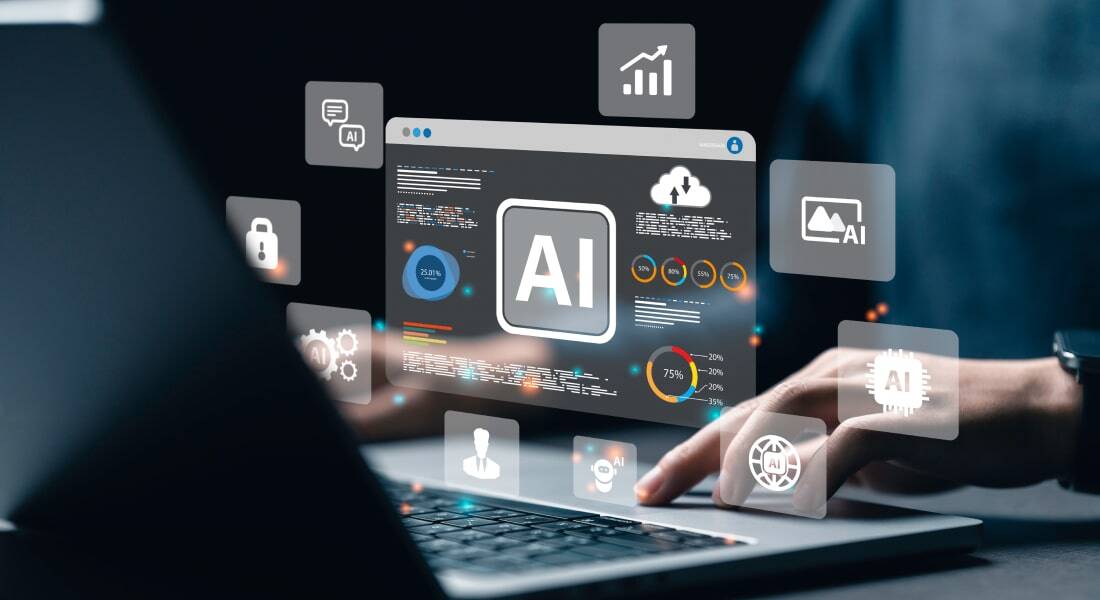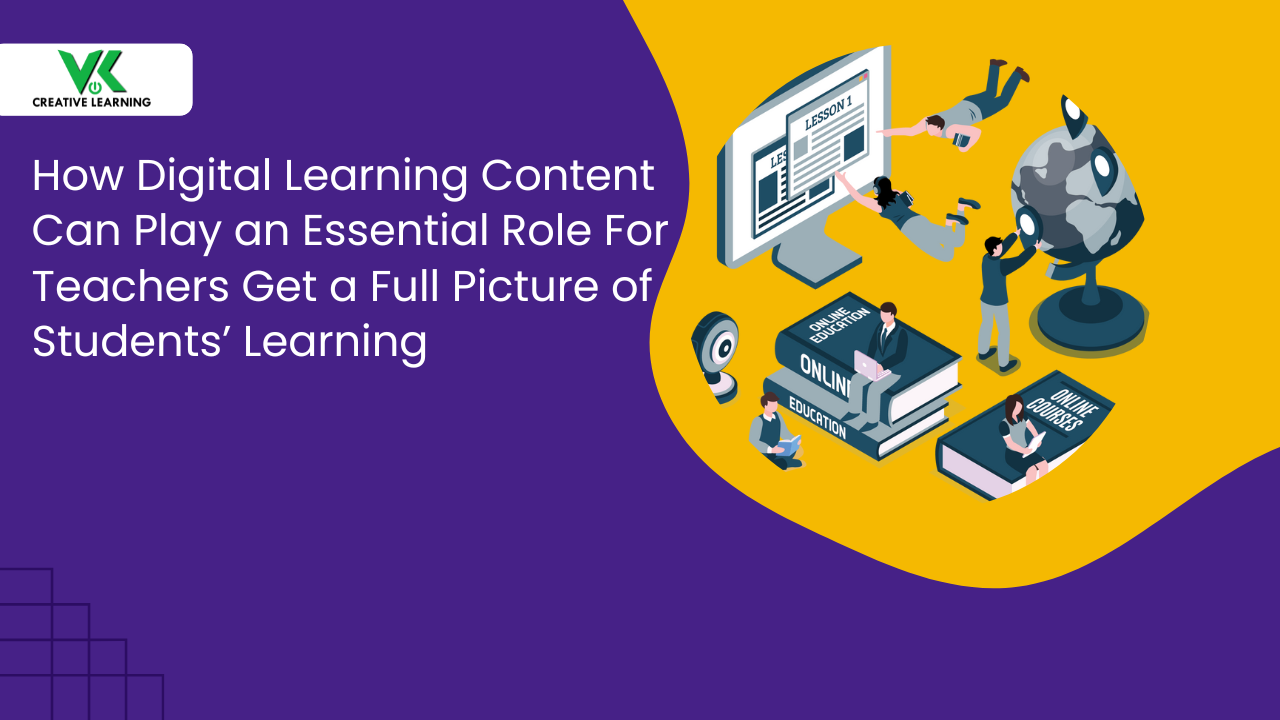Why the Use of AI Question Generators in E-learning Can be Beneficial for Students' Deeper Understanding?
September 07, 2025
AI is more like a human-thinking-machine that makes decisions based on various data fed into the system. E-learning for education is one smart system that can use the quick-thinking ability of AI algorithms.
Best Part: AI in e-learning that can be seen as an always-switched-on system and also an ever-present helper. Importantly, it closely checks out students' learning as well as listening skills and what they have understood.
It then zeroes in on their one-of-a-kind knowledge-absorbing needs. For the same reason, it will be very helpful for students if an AI Question Generator is included in an e-learning platform. Reason: it will serve as a smart information rendering tool and a fast-question-making system too to analyse students' knowledge.
To understand this situation, imagine that there is a video game console that can closely observe the player's play style. Noticing exactly where the player struggles, the AI algorithm creates a sort of made-for-user level.
Similarly, an e-learning AI question generator can create quizzes for students to assess their understanding capacity.
What makes it unique is: It never asks pulled-from-thin-air questions; instead, it creates thoughtfully-made-up and relevant questions. These questions/quizzes are based on what students have studied.
So, it acts as a super-small-sized robot inside your tablet through e-learning modules. Simply put, it scans through the textbook and then it makes quiz questions.
Importantly, these are relevant and personally tailored-just-for-students questions. That is what these wonder-working tools do to enhance deeper learning.
They work quietly--almost hidden--in online-digital-classroom platforms or web-based-learning-environments. They turn brain-bending concepts into simple things such as easy-to-play quiz games. This makes all lessons more interesting and full-of-joy modules.
Additionally, they also make the learning units less mind-heavy and ensure concepts are easy to recall later as when needed. It's like having hidden-from-view levels that ease learning activities.
Table Of Contents:
Understanding What Exactly Is an AI Question Generator
Why E-Learning Needs Smart Questions Today
How AI Question Tools Understand What to Ask
Features of the AI question generator in the e-learning Platform
- Making Revision More Thoughtful and Not Just Repetitive
- Reducing the Pressure of Rote Learning
- Turning Textbooks into Question-Rich Goldmines
- Personalized Learning With Adaptive Questions
- Encouraging Curiosity and Critical Thinking
- Helping Students Who Are Shy or Less Confident
Understanding What Exactly Is an AI Question Generator
An AI Question Generator is more like an automated quiz-making tool that produces swift test generation. This smart algorithmic-powered tool reads information and makes thought-provoking questions.
Teachers can feed into an e-learning platform a lengthy text; it snags truly important information/concepts. The AI is smart enough to fashion questions based on various topics of a chapter.
For students, suppose they are reading a fact-filled chapter about space; the AI system zips through it. It then creates questions like Why is Mars red or rust-colored?'
This helps learners to recall multiple space facts--more like a knowledge-checking tutor. It gets the learners to read concepts repeatedly, think about them, and learn in this way.
Some AI e-learning systems develop choice-based multiple-choice questions; others pose logical and mental ability questions: 'why' or 'how.'
These kick-start deep-engaging thinking among learners. Thus, an AI questionnaire generator is like a highly smart teacher inside the course modules.
Also, these cleverly coded AI question generators from text tools work fast to sync with students' learning pace. They are capable of churning out questions at a quick speed--seriously. In fact, they can turn one whole single-paged story into ten well-structured questions.
Why E-Learning Needs Smart Questions Today
Traditional teaching often uses fixed sets of questions--that too in text form. Also, when every student sees the same quiz, they feel disinterested--even if they’re at different levels. Hence, traditional levels are not always helpful when multiple educational support systems are not in place.
In contrast, question generator AI (smart-quizzing-learning-tool), when incorporated in e-learning, creates questions. These are adjusted as per each learner's level. If a student is a beginner, quiz creation is easy. But if some students are quick to absorb knowledge, challenges are thrown.
Hence, through e-learning AI incorporation, everyone learns differently with smart questions--all these happen step by step.
How AI Question Tools Understand What to Ask
Tools use Natural Language Processing (NLP) algorithms, which enable text comprehension with logic. Think of this language-understanding-bots scanning a story; and giving a wide variety of questions.
Importantly, AI, with its high-end, powered vision eyes, plucks out big-picture core ideas. Additionally, it finds hard-to-grasp concepts and tests students' puzzle-solving skills. It also deciphers below-the-surface meanings and shares them with the learners.
Thus, questions pop up, based on its logic-driven algorithms. AI question generator is prepared to develop thinking skills--not follow rote-learning remembering.
For example, imagine a little-lost puppy story; AI scans the PDF and works as an AI question generator from text.
Features of the AI question generator in the e-learning Platform
Making Revision More Thoughtful and Not Just Repetitive
Most of the students have the habit of just memorizing or reading the text again and again. This doesn’t help the cause of understanding the real meaning of the concepts.
However, when AI-generated questions are used, they have to read the concepts properly. This means that unless they are able to grasp the concepts, they won’t be able to understand. Also, they won’t be able to answer the quiz created by an AI question generator from text.
Technically put, the AI-generator questions encourage them to recall the concepts. It also helps them to apply the concepts that they have learned. Meaning: the brain has to do the work of pulling out information from memory. Learners just can’t look at the text and answer—understand, recall, and answer.
Let’s assume that learners are reading about rainforests. A good question put by AI might be: ‘What would happen if all the trees were cut down?’ This type of thought-provoking question makes learners think, not guess. Thus, learners in the long run understand concepts better.
Reducing the Pressure of Rote Learning
Rote memorization can be tricky and dangerous as it's just about memorizing facts. This means the students try to grasp this subject matter, and they will just go for rote learning.
This is where the introduction of an AI question generator from text in e-learning helps. That is, they aid to break the cycle as different types of questions are asked from the text. This means that unless the students have a thorough comprehension about the concepts, they can’t answer the questions.
Importantly, the AI question generator (reading-based-smart-quizzing) doesn’t just copy questions; it creates fresh ones. These questions have their own fresh ideas, not repetition.
Example: Instead of just asking, When was the structure built, the AI might ask, Why was it built. Or, the question may be what a country would look like without it?”
This kind of different question generated by AI stays longer in the memory of learners. It also makes learning for them meaningful.
Turning Textbooks into Question-Rich Goldmines
The question generator AI in e-learning can scan content through notes in any format. These formats can be in the form of PDF, article, webpage, or book, and based on them, questions are created. That is the exact magic of the question creator in e-learning.
AI digests chapters; it makes questions fast--long-winded. These questions grasp the meaning--not just copied words, deep-seated knowledge. Textbooks thus may become monotonous: a quiz-giving master.
Imagine a learner's textbook asking you questions--like a game! Hence, AI in e-learning is not just a pile of pages anymore. After reading about an adventurous explorer, it might ask you: what made the explorer so brave? This turns reading into an exciting and thought-provoking adventure.
Even better; students can upload notes, their knowledge is tested through an AI questionnaire generator.
Personalized Learning With Adaptive Questions
Every child learns differently; some fast, some are slow in understanding. Accordingly, AI in e-learning adjusts; it follows each learner's pace--one-of-a-kind learning.
Answer correctly; questions offer harder questions--real brain-teasers. Struggle a bit; it offers easier ones--confidence-boosting.
This is called adaptive learning; that is, AI in e-learning capability to mold as per the difficulty level.
Think of it like a game--when players ace a level, the next one is trickier. This new level has new, exciting challenges; if you get stuck, the game them hints.
On the same lines, AI in e-learning for quizzes does that for the learners' brains. Hence, students feel neither stuck on some topic nor bored with learning.
Encouraging Curiosity and Critical Thinking
Why do frogs hop; not just do they? These kinds of questions spark truly active thought. These are AI questionnaire generators, as they are student-engagement-boosting too. They prompt more questions based on several pages and concepts.
That’s how ever-growing curiosity among learners takes root--with it, deeper mind-opening-process thinking.
For instance, a young learner reads about various processes of volcanic formation or eruption. An AI question generator may ask why a city is risky when eruptions happen. This teases out wonder-filled as well as freshly formed concept ideas among the learners.
It's like asking, Why does popcorn pop; more fun-to-answer question than Does popcorn pop? You want to find out the secret; perhaps heat, water, or steam. That's brain-stretching and logic-based-evaluation thinking involved.
Helping Students Who Are Shy or Less Confident
There may be some shy-natured students who hesitate and fear raising their hands. Questions feel silly, easily mocked, or maybe just plain wrong, factually incorrect.
Here's the best part: AI never, ever judges a person and offers a private portal. Thus, it provides a no-pressure-response system; students can answer alone.
This makes learning feel anxiety-reducing and offers a very calming learning environment. Plus, they can retake quizzes--no one is watching them.
This way, they can become self-assured and have a long-lasting belief in themselves. Think about people learning to ride a bike; they might wobble and fall. The AI is a patient and non-judgmental guide, as it holds the bike, letting them try, try again.
Conclusion
VK Creative Learning (VKCL) has vast experience in tailoring a learner-oriented AI question generator. Their e-learning platform, clubbed with an AI questionnaire generator, focuses on conceptual understanding.
This helps in a big way to reduce rote memory reliance. VKCL designs e-learning solutions with questions that fit each learner’s pace. It also tests the thinking ability of learners as per the curriculum needs.
Hence, institutions in India and beyond should approach VKCL for intuitive, scalable e-learning that promotes deeper learning. With custom-made features, detailed analytics, and content-sensitive designs, VKCL’s solutions are game-changers in the education space.




